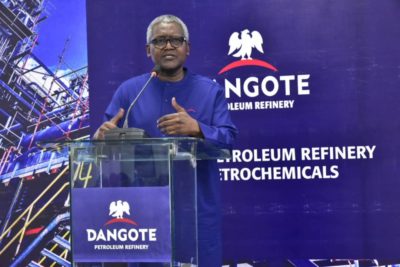The $20 billion Dangote Refinery, once heralded as the beacon of Nigeria’s energy future, is embroiled in controversy. Nigerian citizens eagerly anticipated the relief that both the Dangote and Port Harcourt refineries operating at full capacity would bring. This dream, however, appears to be on hold as the Dangote refinery faces unexpected challenges.
The Dangote Group has accused international oil companies (IOCs) of sabotaging its efforts to secure crude oil. The Nigerian Midstream and Downstream Petroleum Regulatory Authority (NMDPRA) has downplayed these claims. NMDPRA Chief Farouk Ahmed further complicated matters by alleging that the diesel produced by the Dangote refinery is of inferior quality compared to imported diesel, due to its higher sulfur content. He also argued that relying solely on the Dangote refinery would create a monopoly and jeopardize energy security. Ahmed mentioned that the refinery is still in the pre-commissioning stage and has not yet been licensed.
Public Outrage and Allegations of Sabotage
Nigerians have reacted with outrage to Ahmed’s comments, accusing him of protecting the interests of those profiting from fuel imports. Many citizens and public commentators are calling for an investigation into Ahmed’s motives and his potential removal from office. Olusegun Ifade, a prominent public commentator, voiced this sentiment clearly: “Farouk Ahmed’s statement that Dangote refinery product is inferior compared to imported ones and shouldn’t be relied on is clearly sabotage! He must be part of the cabal in the oil industry working to see the end of Dangote refinery. He should be sacked! #SackFaroukNow,” Emeka stated.
Similarly, Olatunji Olalekan asserted that Ahmed’s statement was intended to undermine and sabotage the refinery. He called on the federal government to investigate why Ahmed made such a “ridiculous statement.” The public outcry highlights the deep distrust between Nigerian citizens and those in power, particularly when it comes to the oil industry, which has long been mired in allegations of corruption and inefficiency.
The Future of Dangote Refinery and Nigerian Energy Independence
The Dangote refinery, if successful, promises to transform Nigeria’s energy landscape by significantly reducing the country’s dependency on imported fuel. However, the allegations of sabotage and the regulatory challenges it faces threaten to derail this vision. The Dangote Group’s accusations against IOCs and the NMDPRA’s stance on the refinery’s product quality have created a complex situation that requires urgent resolution.
For Nigeria to achieve energy self-sufficiency, it is crucial that the government addresses these allegations transparently and takes decisive action to ensure that vested interests do not hinder progress. The Dangote refinery represents a significant investment in Nigeria’s future, and its success could pave the way for greater economic stability and growth. The current controversy underscores the importance of regulatory fairness and the need for a collaborative effort to overcome the obstacles facing this ambitious project.
Calls for Resolution: Dangote Refinery vs. NMDPRA
Experts have raised concerns over the ongoing conflict between the Dangote Refinery and the Nigerian Midstream and Downstream Petroleum Regulatory Authority (NMDPRA), calling for a swift resolution. Chinedu Amah, founder of Spark Nigeria, underscored the Dangote Refinery’s advanced technology and questioned the logic behind continued reliance on imports. Amah stated, “The more the federal government allows Dangote to keep importing crude oil and keep importing petrol, then how can our economy pick up?
The Dangote refinery is a more advanced modern refinery than all our other refineries, so it can distillate and treat most of the crude oil to a standard sulfur level. All the noise they are making is politics to cover and give flimsy reasons for their continuous importation.”
Similarly, Mazi Colman Obasi, president of the Oil and Gas Service Providers Association of Nigeria (OGSPAN), stressed the importance of collaboration for the nation’s economic growth. He argued that all parties should work together to leverage the refinery’s capabilities and reduce dependency on foreign imports, thereby strengthening Nigeria’s economic stability.
Impact on Foreign Investment
The criticism directed at the Dangote Refinery by government officials has also sparked concerns about its potential impact on foreign investment. An anonymous expert highlighted the negative implications of such public disparagement on national television. He remarked, “Our government wants foreign investors to bring their monies into this country. Yet, the same officials are on National TV disparaging a $20 billion investment. Imagine stating on TV that the products from a refinery in your country are inferior to imported ones, demarketing a locally owned private business.”
This sentiment is echoed by industry observers who believe that undermining a significant local investment could deter future foreign investments. By criticizing the quality of products from the Dangote Refinery, the government may inadvertently signal a lack of confidence in Nigerian enterprises, potentially driving investors away and harming the country’s economic prospects. Experts advocate for a more supportive approach, recognizing the refinery’s potential to boost local production and reduce import dependence.
Table of Contents
Discover more from OGM News NG
Subscribe to get the latest posts sent to your email.














